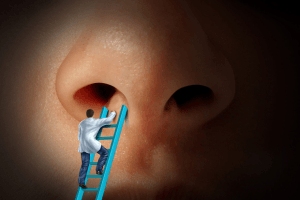Chronic sinusitis, an inflammation of the sinuses that lasts for more than 12 weeks despite treatment attempts, is a condition that affects millions worldwide. If you’ve noticed that your nose is stuffy, blocked, or congested more often than not, chances are you have frequent sinus infections or chronic sinusitis. As annoying and challenging as it may seem to manage the condition, it is not one to ignore.
Because of the complexity of this condition and the challenges that many encounter when symptoms persist, it’s important for you to understand that there are treatment options like sinus surgery available. This blog post aims to answer some of the most common queries to help you better understand and manage chronic sinusitis.
What Is Chronic Sinusitis?
Chronic sinusitis is a condition characterized by inflammation in the sinuses, leading to a buildup of mucus and causing difficulty breathing through the nose. The sinuses are air-filled cavities around your nose, eyes, and cheeks. The condition often comes with facial pain and might be associated with headaches. Unlike acute sinusitis, which is often temporary and triggered by a cold or allergies, chronic sinusitis lasts much longer, typically 12 weeks or more, and can persist for months or even years.
What Causes Chronic Sinusitis?
Several factors contribute to chronic sinusitis, and these can differ from person to person. Some common causes include nasal polyps (small growths in the nasal passage), a deviated nasal septum, respiratory tract infections, allergies, or certain immune system responses to fungi. In many cases, there are multiple factors that lead to the development of chronic sinusitis.
What Are the Symptoms?
Common symptoms of chronic sinusitis include nasal obstruction or congestion. You might experience this as difficulty breathing through your nose due to the thick, discolored discharge leaking from your nostrils or down the back of the throat. As symptoms persist, you may also experience tenderness, pain, and swelling around the mid-facial area ( eyes, cheeks, nose, or forehead).
A reduction in your sense of smell and taste is also common. Many individuals with chronic sinusitis have ear pain, upper jaw and teeth aches, a harsh cough, sore throat, and bad breath. It’s worth noting that these symptoms often vary in intensity and can worsen during respiratory infections like the common cold or during allergy flares.
How Is Chronic Sinusitis Diagnosed?
A diagnosis of chronic sinusitis primarily depends on your medical history and a physical examination. It’s best to see an ENT to confirm the diagnosis or check for underlying conditions. This process might include procedures like nasal endoscopy, imaging studies, such as a CT or MRI scan, nasal and sinus cultures, or an allergy test, depending on the suspected underlying cause.
What Treatment Options Are Available?

Chronic sinusitis treatments involve:
Medications: These can range from saline nasal irrigation, which helps clear nasal passages, to corticosteroids to reduce inflammation. For sinus infections, including those caused by certain types of fungal sinusitis, prescription antibiotics or antifungal medication are provided.
Lifestyle Changes: These involve measures like increasing water and fluid intake to thin mucus, using a humidifier at home, and avoiding known allergens or environmental irritants. Quitting smoking and limiting exposure to secondhand smoke is also beneficial.
Sinus surgery: If the condition doesn’t improve with medication or lifestyle changes, sinus surgery becomes an option. Surgery is necessary to remove polyps and abnormal tissues blocking the nasal passages to widen the airways to facilitate easy breathing. Sinus surgery is also ideal for individuals who develop chronic sinusitis or congestion due to a deviated septum. Endoscopic sinus surgery is the standard in treating chronic sinusitis because it is far less invasive than traditional sinus surgery and has a significantly shorter recovery time.
When Is Sinus Surgery Necessary?
Medical therapy, including antibiotics, nasal corticosteroid sprays, and saline nasal irrigation, is the first line of treatment for chronic sinusitis. While these interventions can effectively manage mild to moderate cases, they may not suffice for chronic, severe, or complex cases. Often, underlying issues like nasal polyps, a deviated septum, or other structural abnormalities prevent effective drainage of the sinuses, making traditional treatments less effective.
Sinus surgery is generally considered when:
- Symptoms persist despite comprehensive medical treatment.
- Recurring sinus infections, despite appropriate therapy, are linked to nasal polyps or other structural abnormalities.
- A fungal sinus infection is present.
- Anatomical abnormalities, such as a deviated septum, hinder sinus drainage.
It’s crucial to remember that the decision to undergo sinus surgery in Los Angeles is not one to make lightly. Optimal surgical outcomes are highest when the procedure is performed by a renowned sinus specialist like Dr. Alen N. Cohen, MD FACS. He is Los Angeles’ Top Super Doctor for over 11 years and counting. Dr. Cohen specializes in providing medical and surgical treatments for individuals experiencing nasal obstruction, a deviated septum, environmental allergies, hypertrophic turbinates, chronic sinusitis, nasal polyps, sinus headaches, and other nasal and sinus disorders.
Types of Sinus Surgery
There are two main types of sinus surgery that help alleviate chronic sinusitis: Endoscopic sinus surgery and balloon sinuplasty.
Endoscopic Sinus Surgery
Endoscopic sinus surgery (ESS) is a minimally invasive procedure, often performed under general anesthesia. The surgeon inserts an endoscope (a thin tube with a light and camera at the end) into the nose to visualize the sinus openings. Then, specialized instruments are used to remove blockages that obstruct sinus drainage, including polyps, scar tissues, or parts of the bone.
ESS provides direct access to the sinus passages, allowing surgeons to address the cause of chronic inflammation effectively. The goal is to widen the sinus openings to improve drainage and ventilation. Post-surgery, patients experience reduced symptoms, fewer infections, and an improved quality of life.
Image Guided Endoscopic Sinus Surgery
Image-guided sinus surgery, also known as computer-assisted or navigation surgery, is a procedure performed using real-time imaging technology to guide the surgeon during the operation. This technique is particularly useful in complex or revision cases, or when the sinus anatomy is distorted due to chronic sinusitis, polyps, or previous surgeries.
Prior to the surgery, the patient undergoes a computed tomography (CT) scan, which provides detailed images of their sinus anatomy. These images are loaded into a computer that’s part of a surgical navigation system. Dr. Cohen performs the procedure via the surgical navigation system. The system provides real-time 3D visualization that enables Dr. Cohen to expertly navigate the patient’s complex sinus anatomy, avoid critical structures, and reach and revise the disease location safely.
Balloon Sinuplasty
Balloon sinuplasty, a newer, less invasive alternative to ESS, is also performed under general or local anesthesia. In this procedure, a small balloon catheter is guided into the inflamed sinus cavity. Dr. Cohen then slowly inflates the balloon to expand the sinus opening and drain built-up mucus and relieve symptoms. After the sinus has been cleaned, the balloon is deflated and removed, leaving the sinus passageways open. The widened sinus passageways allow for better ventilation and drainage of the sinuses. This reduces inflammation and helps prevent further infections and blockages.
Balloon sinuplasty doesn’t involve the removal of bone or tissue. The advantages of Balloon Sinuplasty over traditional sinus surgery include less bleeding, reduced risk of infection, quicker recovery time, and less post-procedure discomfort. It is performed in an outpatient setting, allowing patients to go home the same day. However, certain individuals, especially those with nasal polyps, a deviated septum, or severe sinus disease, may be better suited for alternative sinus surgery procedures, such as septoplasty or an in-office polypectomy.
As with any medical procedure, Balloon Sinuplasty may not be suitable for everyone. It’s critical to have a thorough discussion with a sinus treatment specialist about the potential risks and benefits to make an informed decision about having sinus surgery in Los Angeles.
Surgery improves the sinus drainage pathway, but it doesn’t alter the underlying tendency for inflammation and infection. Therefore, continued medical therapy, including the use of topical nasal corticosteroids, may be necessary to manage chronic inflammation.
Conclusion
Sinus surgery can significantly improve the quality of life for individuals suffering from chronic sinusitis, especially when conservative treatments don’t provide significant or long-term relief. Traditional methods, like endoscopic sinus surgery, or more modern techniques, such as image-guided sinus surgery or balloon sinuplasty, can significantly alleviate the symptoms of chronic sinusitis by improving sinus drainage and reducing inflammation.
However, sinus surgery is typically considered when all other treatment options, including antibiotics, nasal steroids, or other medications, have been exhausted without satisfactory results. Sinus surgery can provide lasting relief for those with chronic sinusitis, improving their quality of life significantly.
Therefore, it’s essential to have an in-depth discussion with an ENT about your symptoms and personal health circumstances to learn if sinus surgery in Los Angeles or an alternative treatment is right for you.

